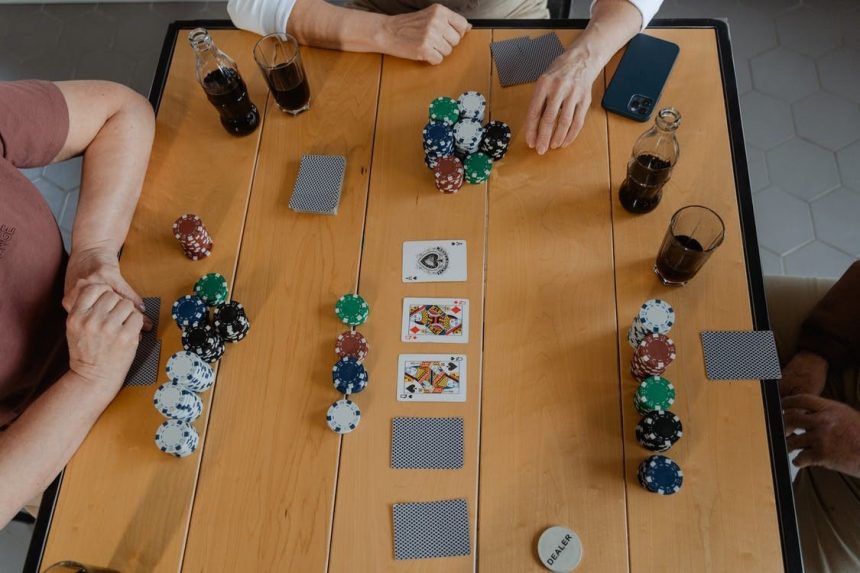Texas Hold ‘Em is the most popular variant of poker on the planet, but it is also perhaps one of the most misunderstood games of all-time. Speak to someone who has never played the game, a social player or a regular online player and they could all easily tell you the same mistruth – that poker is a game of chance.
Naturally, luck and chance do play a role in Texas Hold ‘Em, but those two intangibles also play a role in football, cricket and rugby and they are not referred to as games of chance. Professionals in all of those disciplines know that hard work and determination are the only sure-fire ways to improvement.
The same is true of poker, if you want to become better, win more money and maybe even play in a serious tournament, you can. All you have to do is commit yourself to working hard to make it happen.
In this article we explore some of the easiest ways in which you can improve from an unlucky casual player into a dominant and relentless winning machine.
1. Learn
If you open up your browser and type the words ‘poker strategy’ into Google, you will be confronted with hundreds of links to websites all claiming to have the perfect, fool proof poker strategy.
Those that profess to have plan for every possible scenario or betting pattern that guarantees you will win every hand are completely disingenuous. The only real fool proof poker strategy is to treat the game less like an art and more like something that can be mastered.
To improve you will first need to gain a solid knowledge of probabilities and how they work in relation to the game. ‘Probability For the Enthusiastic Beginner’ by Harvard professor David Morin is a great place to start.
After reading that, move on to ‘The Mathematic of Poker’ by Bill Chen and Jerrod Ankenman, this is the book that will really solidify your new found mathematical knowledge and give you the blueprint to apply it to the game.
Daniel Negreanu famously said, “You don’t need a PhD in mathematics to be a successful poker player”. He is of course right, but a good, working knowledge of probabilities is essential for any aspiring pro.

2. Practice
There are three types of practice; deliberate, blocked and random. To really improve at poker you’ll need to do all three, here is how to do all three:
Deliberate Practice: This is the type of practice where you set out with a specific goal in mind. Once you have familiarised yourself with the mathematics of poker your specific goal will be to work out the probabilities of outcomes the next time you play.
In order to review this you will need to record the community cards, your cards and your opponent’s cards if they reveal them at the end. Input this data into a poker calculator afterwards and the program will tell you the probabilities of each outcome as the hand progressed.
Also Read: The Business Model Adopted by Online Casinos
Check this with the calculations you made in your mind during the hand and if there is something you missed, work out why and try and fill any gaps in your knowledge.
Blocked Practice: This is the practice that most of us are familiar with from our early school days. It involves repeatedly doing something until it becomes automatic, like repetitively spelling words when you were a child.
This works well in poker when you do it with the simple rules that, if you don’t fully know can see you come unstuck. Use blocked practice to memorise all of the possible hands and the betting patterns.
(Blocked practice would be learning all of the poker hand rankings to the point where you could reel them off at a moments notice.)
Random Practice: This involves jumping into a real life example and testing all of your skills and abilities in random. To do this, hop into an online game of poker against people you have never played before and test your mettle.
Remember to make it purposeful though, review the session afterwards and identify areas that you could have improved.
The great Phil Ivey said the following which should be a mantra for how you approach your poker development:
“There are tonnes of mistakes every session, even for me. What separates me from a lot of the other players is that I recognise the mistakes when I make them… I just practice, I think about the game all the time and I am continually trying to get better.”
3. Learn People
“You will show your poker greatness by the hands you fold, not the hands you play”
Dan Reed
The final thing that you need to improve at to become a better poker player is your understanding of poker psychology. There are hands that you will lose when the probabilities of losing them is absolutely miniscule.
Likewise, there are hands that you will win when the probabilities are not in your favour because you have successfully bluffed your opponent.
Bluffing is not as widespread in poker as the media would have you believe, but it is still a skill that is worth mastering. ‘The Body Language of Poker’ by Mike Caro is essential reading for anyone hoping to become a better player.
Read it from cover to cover and you will be armed with all the knowledge you need to successfully call out a bluff from your opponent and to pull one off of your own.
Follow all of the tips in this article and you will improve as a poker player, how much you improve is up to you. If you’re dedicated and commit to improving at every opportunity you will notice far bigger improvements in your game.
If you do put these tips into practice and start winning more hands and boosting your profits, be sure to come back and let us know about your journey in the comments section.














